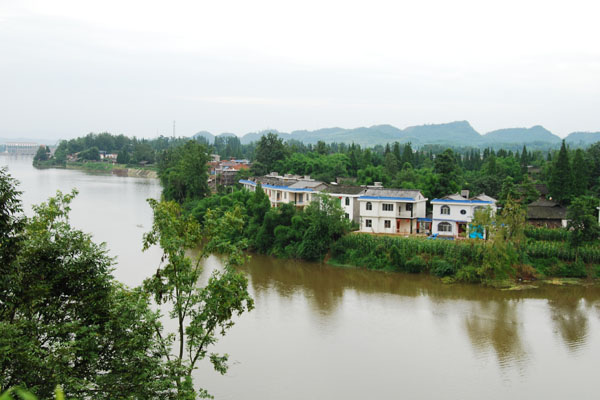Gains of a green drive
Forests are replacing fields for the sake of ecology and economy, and it seems what's good for the planet is good for the wallet. Governor Qin Guangrong of Yunnan exhorts us to make protection of the environment an instinctual response ― at the personal and corporate level.
Good for the wallet
 |
| Hongya County, Sichuan Province. |
"I used to plant corn and rice on my 13 mu (15 mu = 1hectare) of land before the Grain for Green project was carried out. This mountainous area is barren, and the output of my fields wasn't enough to live on. A year's hard work gave me miserly returns, and not a penny saved," said Zhao Liping, a farmer in Wenshan Village of Hongya County, Sichuan Province.
Ten years ago, like 600 other households in the village, Zhao relied on a dozen acres of arable land to barely made ends meet. He contracted a few acres of forestland to supplement his income, but poor mountain paths made the cost of lumber and people movement extremely high, canceling out the revenue.
The year of 2001 saw big changes as projects returning farm plots to forest were piloted here. Zhao was involved, planting eucalyptus and tea on his own land. In addition, he was subsidized RMB 230 for each mu, which almost equaled the farming revenue. With the newly assigned forest, he had a total of over 40 mu of land, and the expected increase in income as the trees grew. Zhao and his fellow villagers were very satisfied.
Thanks to the subsidies Zhao and his family are no longer ruled by the land. They started to raise chickens, cultivate trees and bamboo, or take seasonal work at factories or mines. Three years later, he had some savings set aside and knocked down their old adobes to make way for a new house.
In Zhao's memory, there wasn't a simple multiple-floor residence here before 2001. Not every household in the village has moved into new buildings with multiple stories, but over 80 percent now own a mobile phone. They bought motorcycles too.
"No one imagined the mountains could be as they are today - now roads go where the forests grow. Road construction is most impressive ― there were none to the mountains in the past. We began to work on roads in 2004," Zhao said. "If we were working with the original broken paths, it would take an entire day to shoulder 25 kg fertilizer up. Now tons of timber are transported down in hours."
"It's a piece of cake to carry 25 kg fertilizer with a motorcycle," he grinned. Besides a motorcycle, Zhao also bought a compact car and a van. Peng Changshu, director of the forestry supervision station at the town, pointed out that people as well off or more than Zhao are by no means rare. As forestland was assigned to each household, they all planted bamboo or trees that bring higher returns like cedar, eucalyptus and birch. At present one mu can produce nearly RMB 10,000. For those contracting five or six hundred, even a thousand mu, benefits are quite considerable.
While the successful pilot was still producing results in Wenshan Village, the Grain for Green was kicked off across the country.
 0
0 







Go to Forum >>0 Comments